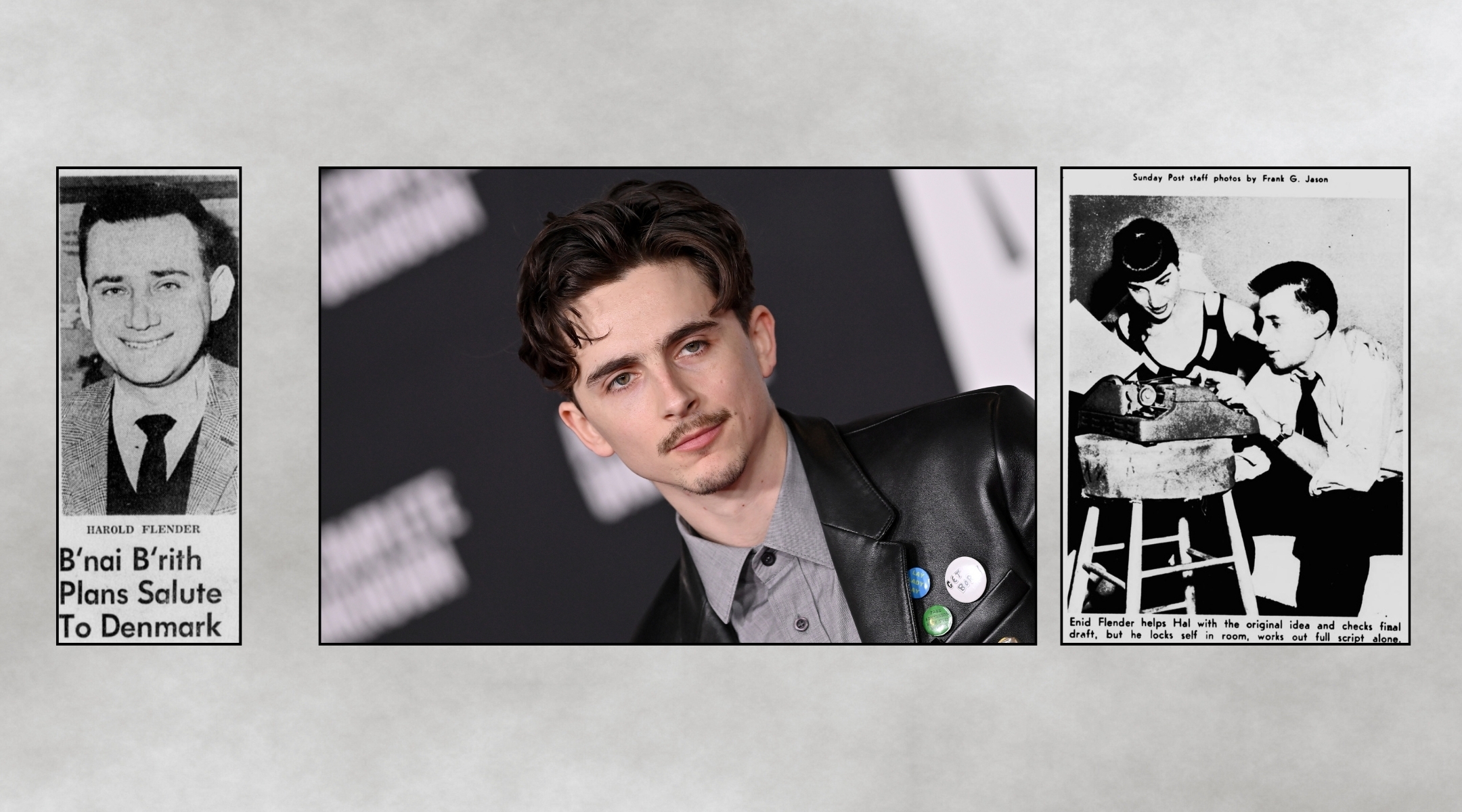Jewish actor Timothée Chalamet is everywhere these days — including in Washington Square Park, where he recently made an appearance at his own lookalike contest.
Ahead of the Dec. 25 release of the Bob Dylan biopic “A Complete Unknown” — for which he is already receiving rave reviews for his portrayal of the Jewish folk musician born Robert Zimmerman — Chalamet has been making the media rounds, including an appearance on Theo Von’s podcast, where he discussed growing up in Mitchell-Lama subsidized housing. (Former New York City Comptroller Scott Stringer, who is Jewish and running for mayor, tweeted about the incident, saying, “I am totally fine with Timothée Chalamet playing me in the biopic.”)
At just 28 years old, the Manhattan native and former NYU student has already racked up a slew of accolades for his roles, including his Academy Award-nominated performance as Jewish teen Elio Perlman in “Call Me By Your Name.”
But not much is known about the A-list actor’s Jewish practice, although his mother, Nicole Flender, has, in the past, shared photos of the family celebrating Passover together that feature her famous son eating matzah, and she’s also shared photos of him with a Hanukkah menorah next to the family’s Christmas tree. His sister, Pauline, recently starred in the Jewish comedy “Between the Temples” and has shared her own Passover celebrations on social media. (Chalamet’s father, Marc Chalamet, is not Jewish.)
This intrepid reporter decided to do a deep dive into Chalamet’s Jewishness. There wasn’t much to go on, but I discovered that his maternal grandfather, Harold “Hal” Flender — for whom Chalamet, whose middle name is Hal, is named — was a television gag writer, an author and a journalist who was born in the Bronx in 1924. Flender’s works, it turns out, were deeply Jewish, including the 1963 book “Rescue in Denmark,” which tells the story of how Danish Jews were rescued during the Holocaust, and he also worked on a 1961 CBS television special about the same subject. (As it happens, there’s currently an exhibit on view at the Museum of Jewish Heritage addressing the same topic.)
Flender may be best known for writing “Paris Blues,” a novel about an African-American jazz musician living in Paris in the 1950s, which was adapted into a film version by Walter Bernstein starring Sidney Poitier and Jewish heartthrob Paul Newman. As a TV writer, Flender worked with some of the biggest names in comedy of the time, including Mel Brooks, Carl Reiner and Woody Allen, writing for sketch comedy shows like Sid Caesar’s “Your Show of Shows” and “The Jackie Gleason Show.”
Flender also worked as a reporter and interviewed many prominent Jewish intellectuals of the mid-20th century, such as Isaac Bashevis Singer, the Nobel Prize-winning novelist (whom he interviewed multiple times, and with whom, in 1970, Singer discussed how he had been offered an advance for an adaptation of his short story “Yentl the Yeshiva Boy” into a film) and Abraham Joshua Heschel, the rabbi, theologian, and civil rights leader. He also interviewed Elie Wiesel, the writer, Holocaust survivor and Nobel Peace Prize winner, which was documented in a compilation of Wiesel’s best interviews.
In 1968, the Jewish Theological Seminary presented a four-part documentary series on the ABC News program “Directions” written by Flender that focused on the history of Yiddish language and culture.
Flender’s works were well-received in the United States, but that wasn’t always the case in other locales — his 1973 book, “The Kids Who Went to Israel: Autobiographical Sketches of Young Immigrants” was banned in the Soviet Union, as JTA reported in 1979, along with many other works by Jewish authors, as well as books about Nazis and the Holocaust.
Apart from his prolific writing career, Flender also taught film writing courses at The New School, Columbia University, New York University, The School of Visual Arts and at schools in France and Senegal.
“You know I’m teaching this course in film writing,” Flender said in a 1970 interview he conducted with Isaac Bashevis Singer for the American Jewish Committee. “We got off on whether teaching is good for a writer and I know some of the people who are teaching fiction writing and they complain that they don’t have many students, that people their [sic] students aren’t interested in books, they are all interested in movies. The young people are only interested in movies.”
In 1952, Harold Flender married Enid Rodman, a ballet dancer, and the couple had two children, Rodman, a film producer, and Nicole, a former Broadway dancer and real estate agent. Nicole, of course, eventually married Marc Chalamet and, lo, on Dec. 27, 1995, a star was born.
A 1955 article in the Boston Post reported that Enid “helps Hal with the original idea and checks final draft but he locks self in room, works out full script alone.”
(Before marrying Enid, Flender was reported to have dated Helen Myerson, the younger sister of Jewish beauty pageant queen Bess Myerson, another Bronx native who was the first and only Jewish Miss America, who later became a politician.)
Harold Flender died in 1975 at the age of 50. Enid died in 2022.
One person we couldn’t find any record of Harold Flender ever meeting? Bob Dylan.
The New York Jewish Week brings you the stories behind the headlines, keeping you connected to Jewish life in New York. Help sustain the reporting you trust by donating today.





